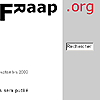 La
situation
et
les
problèmes
des
artistes
plasticiens
français La
situation
et
les
problèmes
des
artistes
plasticiens
français
était
le
thème
d'une
conférence
qui
s'est
tenue
à
Paris
mi-septembre.
Fait
notable,
2
ateliers
étaient
consacrés
à
l'art
numérique,
plus
précisément
au
netart.
Au
centre
du
premier
atelier
se
trouvaient
les
artistes
"digitaux".
Une
quinzaine
de
"netartists"
ont
pris
part
à
la
réunion.
A
retenir
:
-la
grande
diversité
des
formations
des
artistes
:
sociologie,
vidéo,
philosophie,
beaux-arts,
arts
plastiques,
informatique,...
-différentes
motivations
ayant
conduit
à
décider
de
travailler
avec
l'ordinateur.
Ce
dernier
et
internet
ayant
apporté
des
solutions,
des
développements,...
-la
possibilité
pour
plusieurs
de
gagner
leur
vie
par
cette
activité
-aucune
évocation
d'un
arrêt
possible
du
travail
à
l'ordinateur
Remarque
:
la
promotion
du
netart
n'existe
pas
en
France.
Le
gouvernement
français
et
les
institutions
apportent
un
soutien
aux
activités
artistiques
dans
leur
ensemble
:"l'exception
culturelle
française".
Par
méconnaissance
de
la
création
numérique
et
technophobie,
rien
n'est
fait.
Le
système
national
(musées
et
universités)
ne
soutient
donc
pas
la
création
numérique.
Les
institutions
étaient
les
invitées
du
second
atelier.
Comme
on
pouvait
s'y
attendre
seules
des
organisations
locales
ont
décrit
par
quels
moyens
et
dans
quels
buts
elles
contribuent
à
la
promotion
de
l'art
numérique.
Un
regrettable
constat
:
nul
contact
entre
le
monde
de
l'art
et
celui
de
la
science.
Conclusion
:
la
seule
présence
de
l'art
numérique
à
ces
rencontres
mérite
d'être
soulignée.
Pour
la
communauté
du
netart
(pas
seulement
française)
un
peu
de
patience
:
la
France
va
bien
se
rendre
compte
que
le
numérique
existe
!
Meeting
summary
fraap.org
::Isabel
Saij::
|
In
mid-September,
a
conference
took
place
in
Paris
to
discuss
the
situation
and
problems
of
French
visual
artists.
What
was
interesting
was
that
two
workshops
were
dedicated
to
"digital
art;"
in
fact,
they
mainly
focused
on
net
art.
The
focus
of
the
first
workshop
was
net
artists.
About
fifteen
net
artists
took
part
in
it.
Some
of
their
topics
were:
the
diversity
of
their
education, sociology;
video;
philosophy;
visual
art;
computer
science;
the
different
motivations;
what
solutions
both
computer
and
Internet
have
brought
and
are
bringing;
development
(a
reality
for
some
of
them
is
to
live
from
their
creations
with
no
intention
of
giving
up
the
creation
with
computer).
Special
remark:
France
is
not
a
country
where
net
art
is
promoted.
The
French
administration
is
supporting
art
in
general
with
the
notion
of
"French
cultural
exception."
Since
the
administration
doesn't
know
what
to
do
with
"digital
art"
(due
to
technophobia
in
art),
nothing
is
done
to
promote
it.
The
national
system
(i.e.
museums
and
universities)
doesn't
attend
to
digital
art.
Some
institutions
were
invited
for
the
second
workshop.
Only
local
organizations
described
how
they
promote
digital
art
in
different
ways,
with
different
targets—no
surprise.
A
regrettable
fact:
nothing
is
done
at
any
level
to
encourage
the
contacts
between
art
and
science.
Conclusion:
the
fact
that
digital
art
was
part
of
the
conference
is
an
accomplishment.
For
the
net-art
community
(and
not
just
the
French
one
of
course):
France
will
discover
some
day
that
digital
art
exists.
Just
be
patient!
:: Isabel
Saij
::
::Isabel
Saij::
|